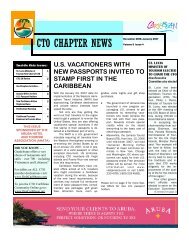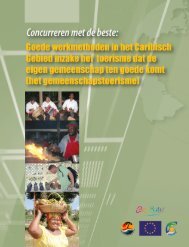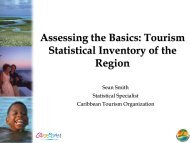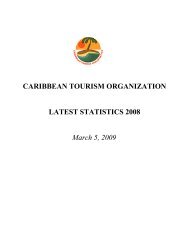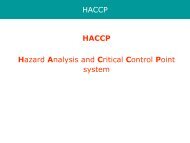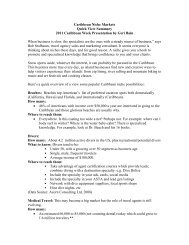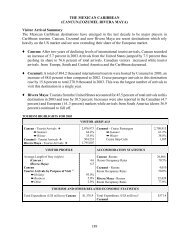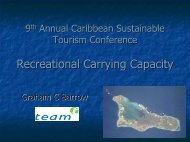TRINIDAD AND TOBAGO - Caribbean Tourism Organization
TRINIDAD AND TOBAGO - Caribbean Tourism Organization
TRINIDAD AND TOBAGO - Caribbean Tourism Organization
Create successful ePaper yourself
Turn your PDF publications into a flip-book with our unique Google optimized e-Paper software.
Protection Enhancement Programme, provide jobs that are not<br />
sustainable either economically or socially and are, in fact, draining<br />
industries such as Travel & <strong>Tourism</strong> of potential employees.<br />
Public awareness of the opportunities offered<br />
by Travel & <strong>Tourism</strong><br />
A major public awareness campaign must be undertaken with the<br />
Ministry of <strong>Tourism</strong>, the TDC and the industry working in partnership<br />
with the Ministry of Education and media to redress this negative<br />
perception. The campaign should reach out to the whole population<br />
and could incorporate:<br />
■ integration of Travel & <strong>Tourism</strong> examples in the school curriculum<br />
and recognition of its value as a subject in its own right, as is the<br />
case with agriculture;<br />
■ the promotion of specialist Travel & <strong>Tourism</strong> courses within<br />
primary and secondary education;<br />
■ television and radio shows highlighting the benefits of working in<br />
tourism and the many different career opportunities offered by the<br />
sector.<br />
38<br />
The Trinidad and Tobago Hospitality Training Institute (TTHTI),<br />
and the tourism departments of The University of the West Indies<br />
(UWI) and University of Trinidad and Tobago (UTT) – all of which<br />
offer a variety of vocational and theoretical Travel & <strong>Tourism</strong> courses –<br />
must engage in proactive recruitment programmes, supported by the<br />
Ministry of <strong>Tourism</strong>, the TDC and the industry. Case studies of alumni<br />
working in a variety of roles in the sector should be publicized to attract<br />
applicants.<br />
Match supply and demand<br />
Most importantly, however, the training institutions and the industry<br />
must work together and communicate with each other to ensure that<br />
courses and training are relevant to the industry’s needs. The industry<br />
can provide support to institutions and students in this regard by<br />
participating in training schemes, offering internships and<br />
communicating the importance of high standards of quality service.<br />
Training institutions must produce a wide spectrum of qualified<br />
employees, who are capable of filling the many different positions<br />
required by the Travel & <strong>Tourism</strong> industry so that the human resources<br />
supplied meet industry needs for bar staff, waiters, chefs and<br />
management, etc.<br />
Compensation in line with with other sectors<br />
Compensation in the Travel & <strong>Tourism</strong> sector must be brought in line<br />
with other sectors so that a potential workforce can benefit fully from<br />
employment in the sector, and so that the value of top-quality<br />
employees is not undermined.The government can assist the industry in<br />
achieving this by implementing labour laws which take into account the<br />
need for greater flexibility – to accommodate the seasonality, daily flows<br />
and other operating characteristics of a 24/7 industry.<br />
Support for qualified Travel & <strong>Tourism</strong><br />
workers<br />
Finally, government and industry must ensure that high standards are<br />
maintained by actively supporting and promoting those employees who<br />
have worked hard to gain certification. Awareness of such programmes<br />
must be promoted within the industry, to tourists and to the general<br />
public so that their value, and that of Travel & <strong>Tourism</strong> in general, is<br />
maintained.<br />
CREATE A COMPETITIVE BUSINESS<br />
ENVIRONMENT THAT ENCOURAGES<br />
INVESTMENT<br />
The general investment climate in Trinidad and Tobago is favourable<br />
with a number of tax incentives and open encouragement of private<br />
enterprise and foreign investment.The <strong>Tourism</strong> Development Act 2000<br />
provides the framework for such incentives.<br />
However, as the report by the <strong>Tourism</strong> and Industrial<br />
Development Company of Trinidad and Tobago (TIDCO) on investor<br />
perceptions in the country points out, several factors are greatly<br />
hindering potential investors. Government bureaucracy is at the heart<br />
of this, highlighted in the Strategic <strong>Tourism</strong> Development Plan: Towards<br />
Vision 2020, which refers to the “multiple bureaucratic constraints that<br />
obstruct and retard the development process” and plans to “convert<br />
the existing negative culture into a responsive, ‘can do’ attitude”.<br />
WTTC endorses this approach and would go a stage further to suggest<br />
that a dedicated, one-stop shop for Travel & <strong>Tourism</strong> investors be<br />
established.<br />
Taxation<br />
There is an increasing tendency worldwide for governments to target<br />
Travel & <strong>Tourism</strong> as a revenue generator to meet short-term budget<br />
objectives, with little thought to the longer-term consequences on<br />
demand and job creation. WTTC urges the Government of Trinidad<br />
and Tobago to ensure fiscal regimes that encourage tourism growth,<br />
exports, investment, infrastructure, business innovation and job<br />
creation. The ‘User Pays – User Benefits’ principle should be given<br />
priority, with funding collected earmarked for Travel & <strong>Tourism</strong><br />
infrastructure and promotion.<br />
Furthermore, it is vital that taxes applied are equitable and, where<br />
possible, hypothecated. One of the most contentious issues in the<br />
<strong>Caribbean</strong> region is the inequitable treatment of land-based tourists<br />
compared with cruise passengers. In Trinidad and Tobago, the former<br />
pay TT$100 departure tax while the latter pay only a token port<br />
charge, if anything.<br />
With this said, it is important that the authorities in Trinidad and<br />
Tobago recall the WTTC Principles and Guidelines of Intelligent Taxation<br />
and refer to these principles when they consider new taxes or<br />
adjustments to existing tax structures.



